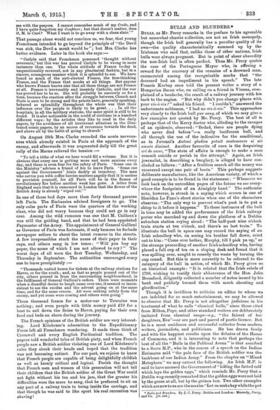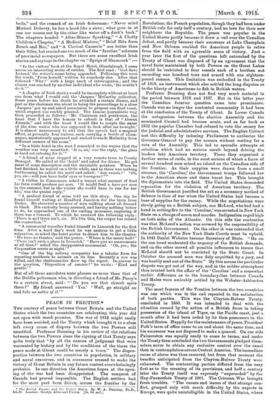BULLS AND BLUNDERS.*
BULLS, as Mr. Percy remarks in the preface to his agreeable but somewhat chaotic, collection, are not an Irish monopoly, though the Irish bull generally has a peculiar quality of its own—the quality characteristically summed up by the Irishman who said that, unlike those of other nations, Irish bulls were always pregnant. But in point of sheer absurdity the non-Irish bull is often perfect. Thus Mr. Percy quotes the case of the Portuguese Mayor who, in offering a reward for the recovery of the remains of a drowned man, enumerated among the recognizable marks that "the deceased had an impediment in his speech." The late Francis Korbay once told the present writer a story of a Hungarian Baron who, on calling on a friend in Vienna, com- plained of a headache, the result of a railway journey with his back to the engine. "But why didn't you change places with your visd-vie ?" asked his friend. "I couldn't," answered the unfortunate nobleman, "I had no sic-fl-vie." This approaches very closely to the Irish bull per sang, of which we may give a few examples not quoted by Mr. Percy. The best of all is perhaps that of the Kerry doctor who, alluding to the ravages of an epidemic, observed: " Bedad, there are people dying who never died before "—a really luciferous bull, and all through the use of the indicative for the conditional, as in Juvenars Antoni gladios potuit conteennere ei lie ontnia disisset. Another favourite of ours is the despairing eri de mar, "The state of affairs is enough to make a man commit suicide or perish in the attempt." Again, an Irish journalist, in describing a litirgliny, is alleged to have con- cluded as follows "After a fruitless search all the money was recovered except one pair of boots." This -perhaps suggests deliberate manufacture, like the American variety, of which a good example is to be found in the statement "Whenever no look back on the untrodden pages of the future we see every- where the footprints of an Almighty hand." The authentic note, however, in struck in a saying which occurs in one of Sheridan Le Famis short stories when one of the characters observes "The only way to prevent what's past is to put a Atop to it before it happens." To these instances of the bull in time may be added the performance of the Irish railway porter who marched up and down the platform of a Dublin suburban station crying aloud "The half-past nine o'clock train starts at ten o'clock, and there's no last train." To illustrate the bull in space one may record the saying of an Irish schoolboy who, on seeing his brother fall down, cried out to him: "Come over bother, Murphy, till I pick ye up," or the strange proceeding of another Irish schoolboy who, having placed a full cup of tea on a sloping desk and found that it was spilling over, sought to remedy the waste by turning the cup round. But this is more correctly to be referred to the category of the bull in action, of which Mr. Percy gives us. an historical example "Ibis related that the Irish rebels of 1798, wishing to testify their abhorrenee of the Hon. John Beresford, diligently collected a number of notes issued by his bank and publicly burned them with much shouting and glorification."
Though it is invidious to criticize an editor to whom we are indebted for so much entertainment, we may be allowed to observe that Mr. Percy is not altogether judicious in his treatment of what he calls "classical bulls," since those cited from Milton, Pope, and other standard writers are deliberately imitated from classical usage—e.g., "the fairest of her daughters, Eve"—or are part and parcel of poetic licence. But he is a most assiduous and successful collector from modern writers, journalists, and politicians. lie has drawn freely and with the happiest results upon the debates of the House of Commons, and it is interesting to note that perhaps the best of all the "Bulls in the Political Arena" is that ascribed to a Scots M.P., who in the course of a speech on the Indian Estimates said "the pale face of the British soldier was the backbone of our Indian Army." From the chapter on "Mixed Metaphors" we may extract the following. An Irish M.P. is said to have accused the Government of "killing the fatted calf which lays the golden eggs," which reminds Mr. Percy that a Dublin wag recently remarked that the golden eggswere not laid by the goose at all, but by the guinea hen. Two other examples which are newtons are the maxim "Let us make hay while the pot • Bells and Thunder.. 5y3. C. Percy. Dublin and Louden Neeredy, Percy, and Co. [le. net.)
boils," and the remark of an Irish fisherman: "Never mind Michael Doherty, be has a head like a sieve ; what goes in at one ear comes out by the other like water off a duck's back." The chapters headed "After-Dinner Speaking," " A Chatty Children's Chapter,"" A Medical Mixture," "Brief Bits from Bench and Bar," and "A Clerical Causerie" are better than their titles, but remind one too much of the "facetiae" columns of provincial newspapers. But there are some excellent Irish stories and sayings in the chapter on "Sprigs of Shamrock" :—
"In the visitors' book at the Royal Hotel, Glendalough, I came across an interesting series of entries. The first read: 'Gad Save Ireland,' the writer's name being appended. Following this were the words, 'From herself,' written by somebody else. After that followed ' Why ?' with a largo mark of interrogation ; and the climax was reached by another individual who wrote, 'Ho couldn't " A chapter of Irish stories would be incomplete without at least one from what I would call the 'Jacques' McCarthy collection. Some years before his death he attended a certain dinner, and just as the chairman was about to bring the proceedings to a close Jacques' got up and asked permission to propose one final toast, which request was readily granted. The famous journalistic wag then proceeded aki follows Mr. Chairman and gentlemen, the toast that I have the honour to submit is that of "Absent Friends," and with the toast I would like to couple the name of the wine waiter who was supposed to look after me to-night.' It is almost unnecessary to add that the speech had a magical effect, as presently four waiters, each carrying a bottle of cham- pagne, mysteriously appeared and rushed towards McCarthy from different corners of the room."
"In a little hotel in the west I remarked to the waiter that the 'weather was very unsettled: 'It is, sir,' was the reply, the glass is hard set catering for it."
"A friend of mine stopped at a very remote town in County Donegal. He called at the 'hotel' and asked for dinner. He got meat of some description and the inevitable potatoes. When he bad finished, he waited on a little while, and as there was nothing forthcoming his called the maid and asked: 'Any sweets " Oh, yes, sir—will you have bulls' eym or losengers ?'" " A visitor to Connemara asked a tenant what amount of food his farm could produce per acre. 'It might feed a hare per acre in the summer, but in the winter she would have to run for her life,' was the quaint reply."
"A medical friend of mine told me this story. One day he found himself waiting at Headford Junction for the train from Tralee. Be observed a number of men walking about all dressed in black. His curiosity being aroused, and having nothing better to do, he approached one of the waiting mourners, enquiring if them was a funeral. To which he received the following reply, 'There is and there isn't, sir. It's like this, the corpse has missed the connection.'"
"A commercial traveller found himself in Limerick for the first time. After a hard day's work he was anxious to get a little relaxation, so asked the hotel porter to direct him to the theatre.
We have no theatre,' said the porter. Where is the music hall?' 'There isn't such a place in Limerick.' Have you no amusements at all then F' asked the disappointed commercial 'Oh, yes ; the Corporation meets at night."
"Ono of the big railway companies has a tabular form for reporting accidents to animals on its line. Recently a cow was killed, and the stationmaster drew up the report. In answer to the question, 'Disposition of carcass ?' he wrote 'Kind and
gentle."
But of all these anecdotes none pleases us more than that of the Dublin policeman who, in directing a friend of Mr. Percy's to a certain street, said "'Do you see that church spire there?' rak friend answered 'Yes,' Well, go straight on and take no notice of it.'"











































 Previous page
Previous page